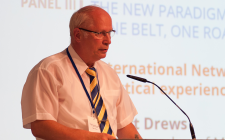Talal Moualla
Board of Trustees, The Syria Trust for Development, Executive director of “Syrian Cultural Heritage Transformation” project – Ministry of Culture, Syria
Repositioning of the cultural variable – Towards a new modern cultural approach
Welcome. It is difficult to speak now, after we have seen this film about Aleppo and its details, and the presentation of Mrs. Dr. Buthaina Shaaban. I am an artist, first and foremost. I am a researcher in modern aesthetics, and also an organizer of international artistic and cultural events.
I spent the last quarter century outside of Syria, but I returned with the outbreak of the war. The war started in a simple way, but it became more and more complicated, and the more complicated it got, the more I believed, that I should stay and do something about it. And therefore, I work as an independent artist, a freelancer, and I am also an acknowledged expert on heritage by UNESCO.
I never thought about talking about myself, because I always talk about others. My paintings and my writings were the expressions of myself. So, the more the crisis became complicated in Syria, the more my interest in public affairs of society increased.
Inside Syria, we believe that there is a direct targeting of the country’s heritage and culture. It is a terrorism that leads to the deconstruction of the society from inside. We, as intellectuals, believe that this terrorism that is targeting us, has two sides. One is intellectual terrorism, the other is terrorism targeting morals and ethics in general.
I never thought that I would ever describe what I have witnessed and seen in this war. But it is obvious that my narration and my explanations are my creative tool to explain the situation — intellectual, cultural and artistic creativity.
Participating with members of my society in re-establishing the cultural identity of our society is essential. It is a conflict that starts with searching security, and ends with confronting terrorism. So, therefore, as intellectuals, whether we are inside Syria or outside Syria, we are endeavouring to present Syria’s cultural and heritage role, in these meetings, that bring us together, and the institutions that help preserve the identity of our culture.
Terrorism targeted culture, first of all, in Syria, and you have seen a lot about that. And it also targeted the memory. Therefore, museums and archaeological sites were targeted and destroyed, and human beings were targeted and removed from their places with all their values — culture, traditions and norms and all else.
Of course, talking about politics is a long discussion, but what we have here is a political crisis which has implications for culture and every other aspect. And it affects the identity, the belonging to society, and the communication in society.
And therefore, as intellectuals, we believe that the only way we can deal with this problem, is to call for more creativity — artistic creativity and a dialogue of cultures, and promotion of the creative activities of artists in society. And thinking wisely, to reconstruct the human being inside Syria – mankind first, and the other issues come later.
The crisis in Syria is not a crisis of a state, as usually it is discussed. It is a crisis of a society which is used to producing culture and civilization for the whole world. We have many issues
that need answers, but answering them also depends on the international community’s position, and the public opinion and international organizations, and the law which has to promote and enhance the values of humanity.
We suffer from the mass exodus of intellectuals, and the dangers that result from that are many. Those who emigrate are the spirit of Syria, because culture was always the spirit of nations.
In front of the destruction of all the major features of culture in Syria, I saw that the burning of my atelier and the hundreds of paintings I had made, by those terrorists, does not mean anything. Because the violent tendency of these terrorists is to implant the idea of the use of violence. Through their barbarism, they take out the humanity out of human beings. In their attack on culture, they are very conscious of the fact that what they are doing, is destroying the unity of society.
All nations have experienced wars. These are the moments of transformation for humanity. And we all have to be optimistic, of course, if we believe that creativity always plays a key role in peace, establishing peace.
I thank the Schiller Institute for this invitation, and I give my special thanks to the venerable chairwoman of the institute, Mrs. Helga Zepp-LaRouche, and Mr. Ulf Sandmark, whom I met in Damascus, and Mr. Hussein Askary for helping me to convey my feelings to you. I leave you now, hoping to meet you once again, in my home country, Syria.
Audio (mp3):













